Corporate Governance and Ethics: Amazon's Australian Retail Entry
VerifiedAdded on 2020/03/13
|13
|3164
|63
Report
AI Summary
This report examines the implications of Amazon's potential entry into the Australian retail market, analyzing the perspectives for and against its presence while considering government intervention. It explores the impact on consumers and local retailers, highlighting the benefits of lower prices, a wide range of products, and efficient delivery services. The report further delves into relevant ethical theories, including utilitarianism, deontological theory, and teleology, to assess Amazon's actions and their consequences. It concludes that although Amazon's adoption may benefit customers, it could negatively affect local retailers due to increased competition. The report also points out the lack of clarity in Amazon's tax payment and worker treatment concerns.
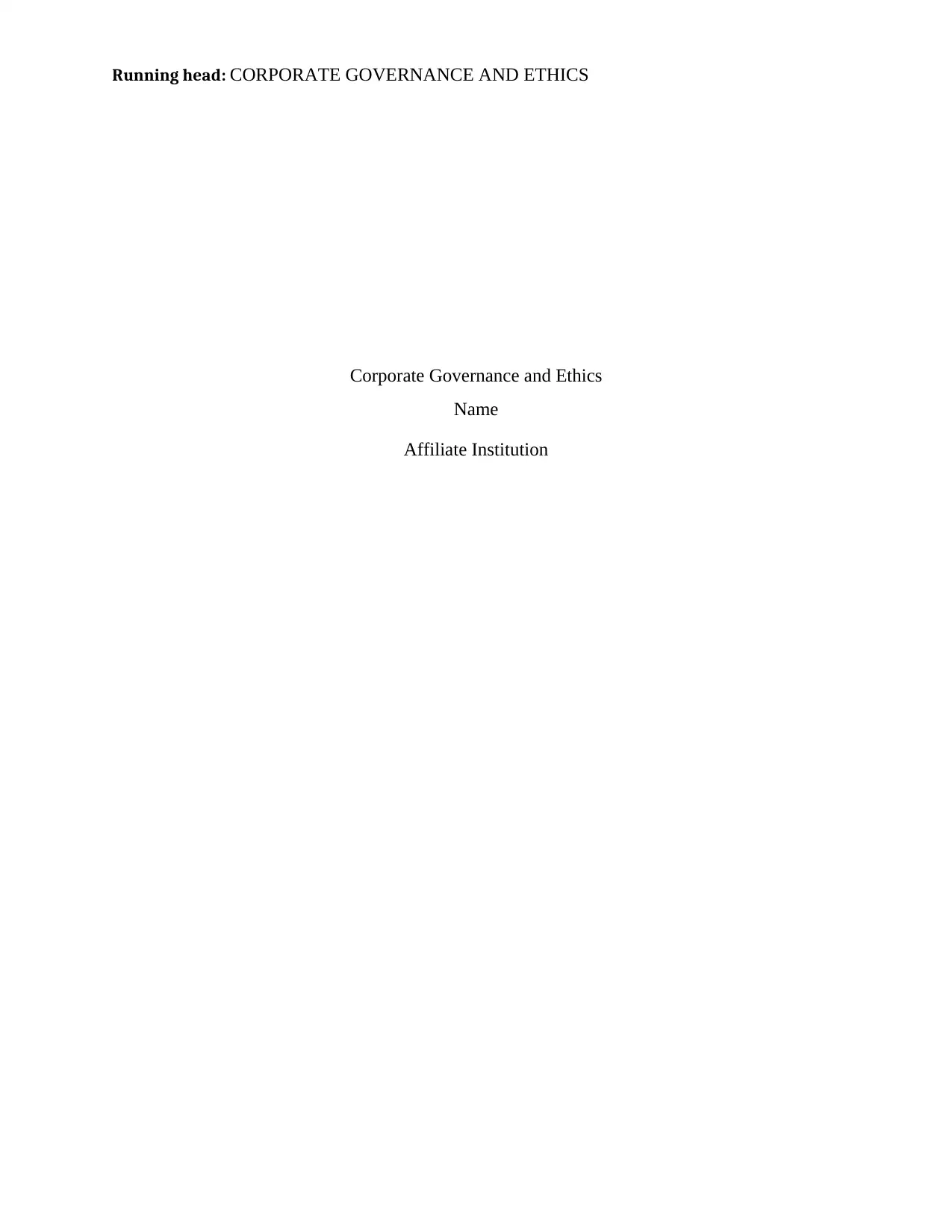
Running head: CORPORATE GOVERNANCE AND ETHICS
Corporate Governance and Ethics
Name
Affiliate Institution
Corporate Governance and Ethics
Name
Affiliate Institution
Paraphrase This Document
Need a fresh take? Get an instant paraphrase of this document with our AI Paraphraser
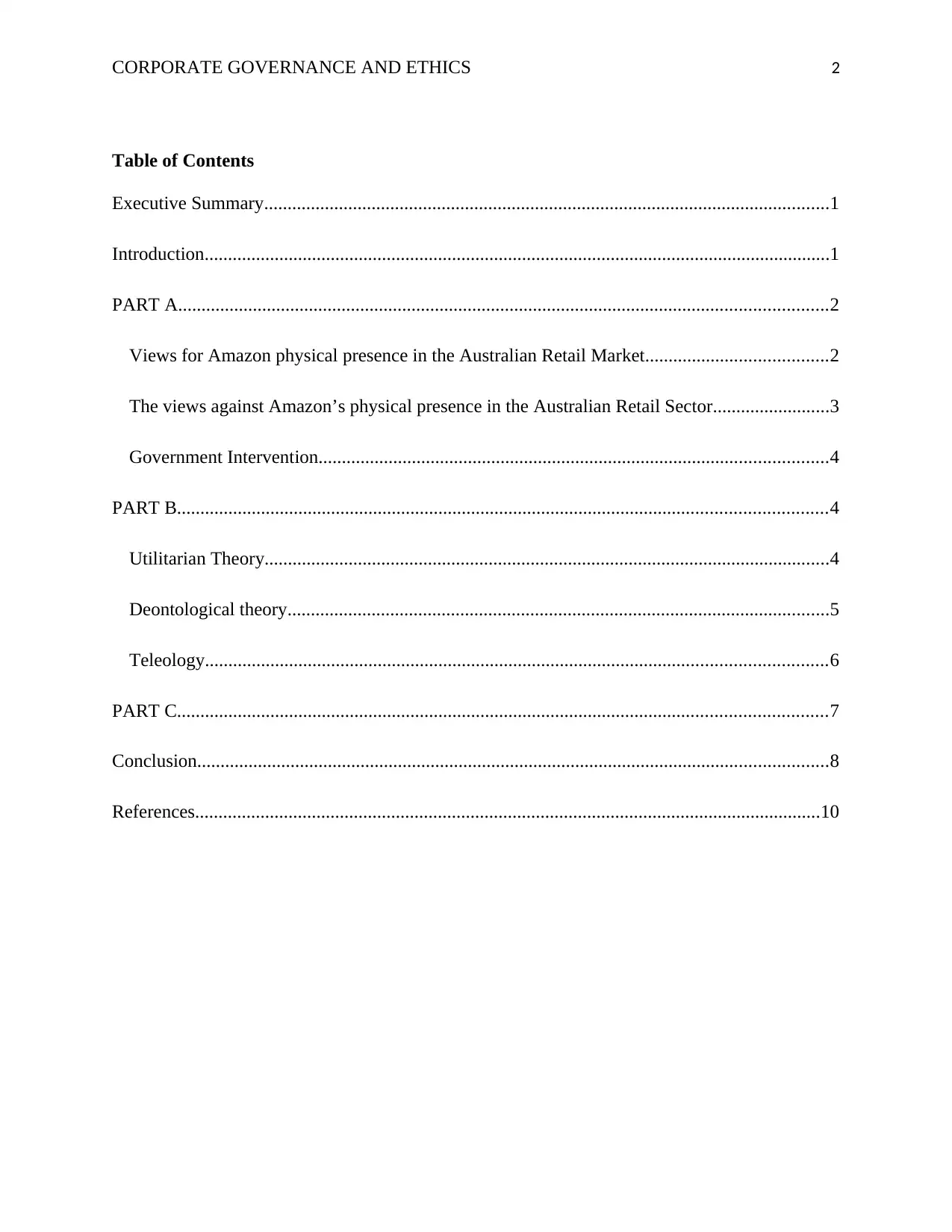
CORPORATE GOVERNANCE AND ETHICS 2
Table of Contents
Executive Summary.........................................................................................................................1
Introduction......................................................................................................................................1
PART A...........................................................................................................................................2
Views for Amazon physical presence in the Australian Retail Market.......................................2
The views against Amazon’s physical presence in the Australian Retail Sector.........................3
Government Intervention.............................................................................................................4
PART B...........................................................................................................................................4
Utilitarian Theory.........................................................................................................................4
Deontological theory....................................................................................................................5
Teleology.....................................................................................................................................6
PART C...........................................................................................................................................7
Conclusion.......................................................................................................................................8
References......................................................................................................................................10
Table of Contents
Executive Summary.........................................................................................................................1
Introduction......................................................................................................................................1
PART A...........................................................................................................................................2
Views for Amazon physical presence in the Australian Retail Market.......................................2
The views against Amazon’s physical presence in the Australian Retail Sector.........................3
Government Intervention.............................................................................................................4
PART B...........................................................................................................................................4
Utilitarian Theory.........................................................................................................................4
Deontological theory....................................................................................................................5
Teleology.....................................................................................................................................6
PART C...........................................................................................................................................7
Conclusion.......................................................................................................................................8
References......................................................................................................................................10
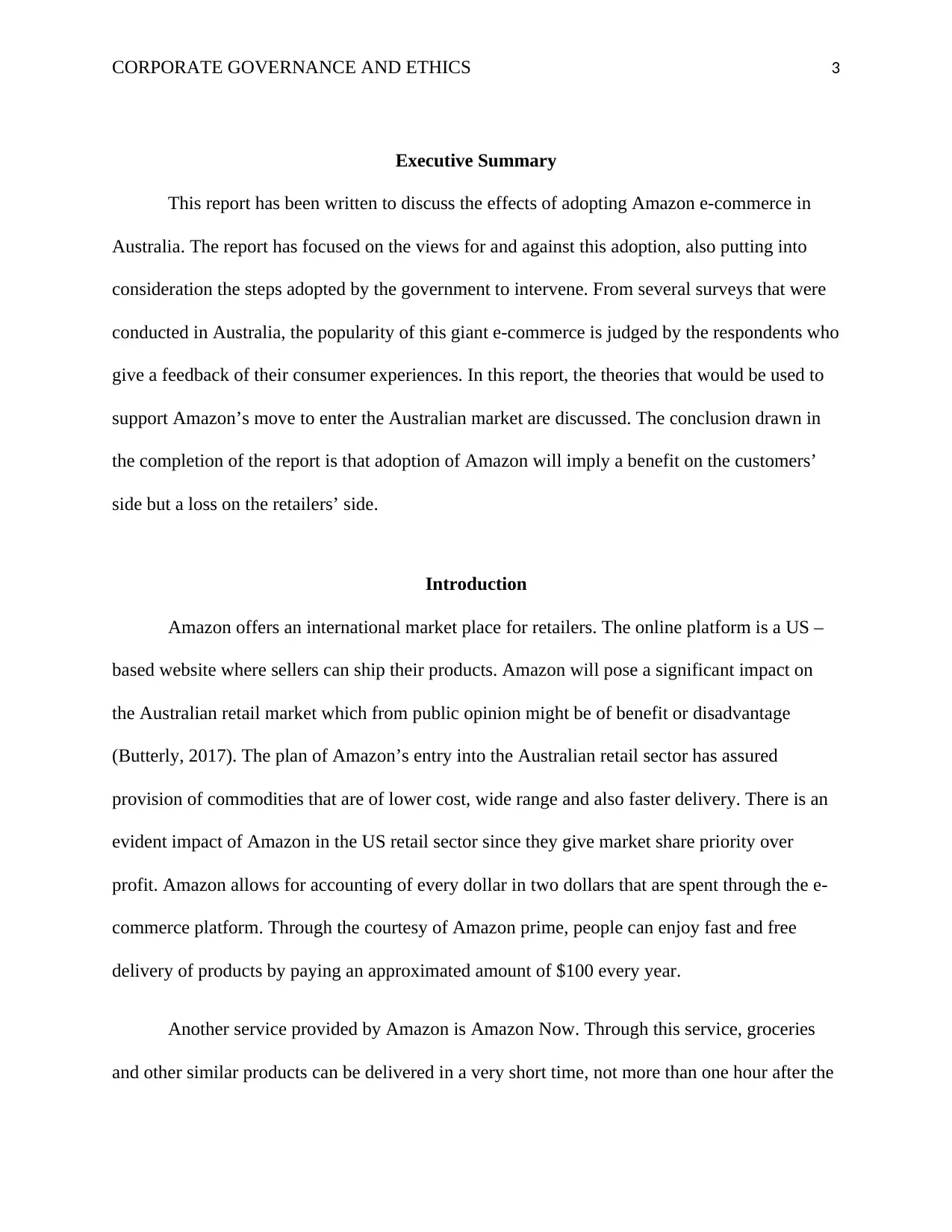
CORPORATE GOVERNANCE AND ETHICS 3
Executive Summary
This report has been written to discuss the effects of adopting Amazon e-commerce in
Australia. The report has focused on the views for and against this adoption, also putting into
consideration the steps adopted by the government to intervene. From several surveys that were
conducted in Australia, the popularity of this giant e-commerce is judged by the respondents who
give a feedback of their consumer experiences. In this report, the theories that would be used to
support Amazon’s move to enter the Australian market are discussed. The conclusion drawn in
the completion of the report is that adoption of Amazon will imply a benefit on the customers’
side but a loss on the retailers’ side.
Introduction
Amazon offers an international market place for retailers. The online platform is a US –
based website where sellers can ship their products. Amazon will pose a significant impact on
the Australian retail market which from public opinion might be of benefit or disadvantage
(Butterly, 2017). The plan of Amazon’s entry into the Australian retail sector has assured
provision of commodities that are of lower cost, wide range and also faster delivery. There is an
evident impact of Amazon in the US retail sector since they give market share priority over
profit. Amazon allows for accounting of every dollar in two dollars that are spent through the e-
commerce platform. Through the courtesy of Amazon prime, people can enjoy fast and free
delivery of products by paying an approximated amount of $100 every year.
Another service provided by Amazon is Amazon Now. Through this service, groceries
and other similar products can be delivered in a very short time, not more than one hour after the
Executive Summary
This report has been written to discuss the effects of adopting Amazon e-commerce in
Australia. The report has focused on the views for and against this adoption, also putting into
consideration the steps adopted by the government to intervene. From several surveys that were
conducted in Australia, the popularity of this giant e-commerce is judged by the respondents who
give a feedback of their consumer experiences. In this report, the theories that would be used to
support Amazon’s move to enter the Australian market are discussed. The conclusion drawn in
the completion of the report is that adoption of Amazon will imply a benefit on the customers’
side but a loss on the retailers’ side.
Introduction
Amazon offers an international market place for retailers. The online platform is a US –
based website where sellers can ship their products. Amazon will pose a significant impact on
the Australian retail market which from public opinion might be of benefit or disadvantage
(Butterly, 2017). The plan of Amazon’s entry into the Australian retail sector has assured
provision of commodities that are of lower cost, wide range and also faster delivery. There is an
evident impact of Amazon in the US retail sector since they give market share priority over
profit. Amazon allows for accounting of every dollar in two dollars that are spent through the e-
commerce platform. Through the courtesy of Amazon prime, people can enjoy fast and free
delivery of products by paying an approximated amount of $100 every year.
Another service provided by Amazon is Amazon Now. Through this service, groceries
and other similar products can be delivered in a very short time, not more than one hour after the
⊘ This is a preview!⊘
Do you want full access?
Subscribe today to unlock all pages.

Trusted by 1+ million students worldwide
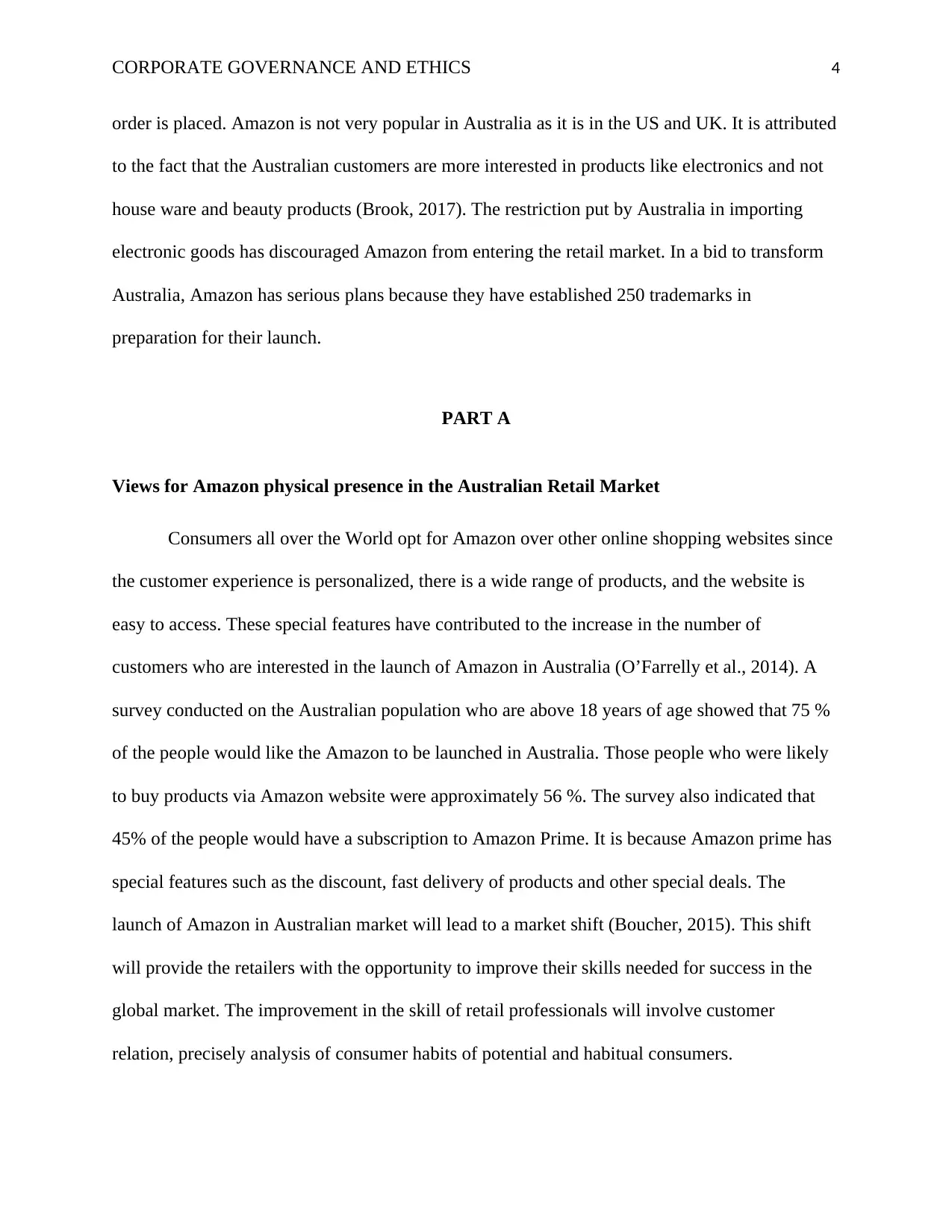
CORPORATE GOVERNANCE AND ETHICS 4
order is placed. Amazon is not very popular in Australia as it is in the US and UK. It is attributed
to the fact that the Australian customers are more interested in products like electronics and not
house ware and beauty products (Brook, 2017). The restriction put by Australia in importing
electronic goods has discouraged Amazon from entering the retail market. In a bid to transform
Australia, Amazon has serious plans because they have established 250 trademarks in
preparation for their launch.
PART A
Views for Amazon physical presence in the Australian Retail Market
Consumers all over the World opt for Amazon over other online shopping websites since
the customer experience is personalized, there is a wide range of products, and the website is
easy to access. These special features have contributed to the increase in the number of
customers who are interested in the launch of Amazon in Australia (O’Farrelly et al., 2014). A
survey conducted on the Australian population who are above 18 years of age showed that 75 %
of the people would like the Amazon to be launched in Australia. Those people who were likely
to buy products via Amazon website were approximately 56 %. The survey also indicated that
45% of the people would have a subscription to Amazon Prime. It is because Amazon prime has
special features such as the discount, fast delivery of products and other special deals. The
launch of Amazon in Australian market will lead to a market shift (Boucher, 2015). This shift
will provide the retailers with the opportunity to improve their skills needed for success in the
global market. The improvement in the skill of retail professionals will involve customer
relation, precisely analysis of consumer habits of potential and habitual consumers.
order is placed. Amazon is not very popular in Australia as it is in the US and UK. It is attributed
to the fact that the Australian customers are more interested in products like electronics and not
house ware and beauty products (Brook, 2017). The restriction put by Australia in importing
electronic goods has discouraged Amazon from entering the retail market. In a bid to transform
Australia, Amazon has serious plans because they have established 250 trademarks in
preparation for their launch.
PART A
Views for Amazon physical presence in the Australian Retail Market
Consumers all over the World opt for Amazon over other online shopping websites since
the customer experience is personalized, there is a wide range of products, and the website is
easy to access. These special features have contributed to the increase in the number of
customers who are interested in the launch of Amazon in Australia (O’Farrelly et al., 2014). A
survey conducted on the Australian population who are above 18 years of age showed that 75 %
of the people would like the Amazon to be launched in Australia. Those people who were likely
to buy products via Amazon website were approximately 56 %. The survey also indicated that
45% of the people would have a subscription to Amazon Prime. It is because Amazon prime has
special features such as the discount, fast delivery of products and other special deals. The
launch of Amazon in Australian market will lead to a market shift (Boucher, 2015). This shift
will provide the retailers with the opportunity to improve their skills needed for success in the
global market. The improvement in the skill of retail professionals will involve customer
relation, precisely analysis of consumer habits of potential and habitual consumers.
Paraphrase This Document
Need a fresh take? Get an instant paraphrase of this document with our AI Paraphraser
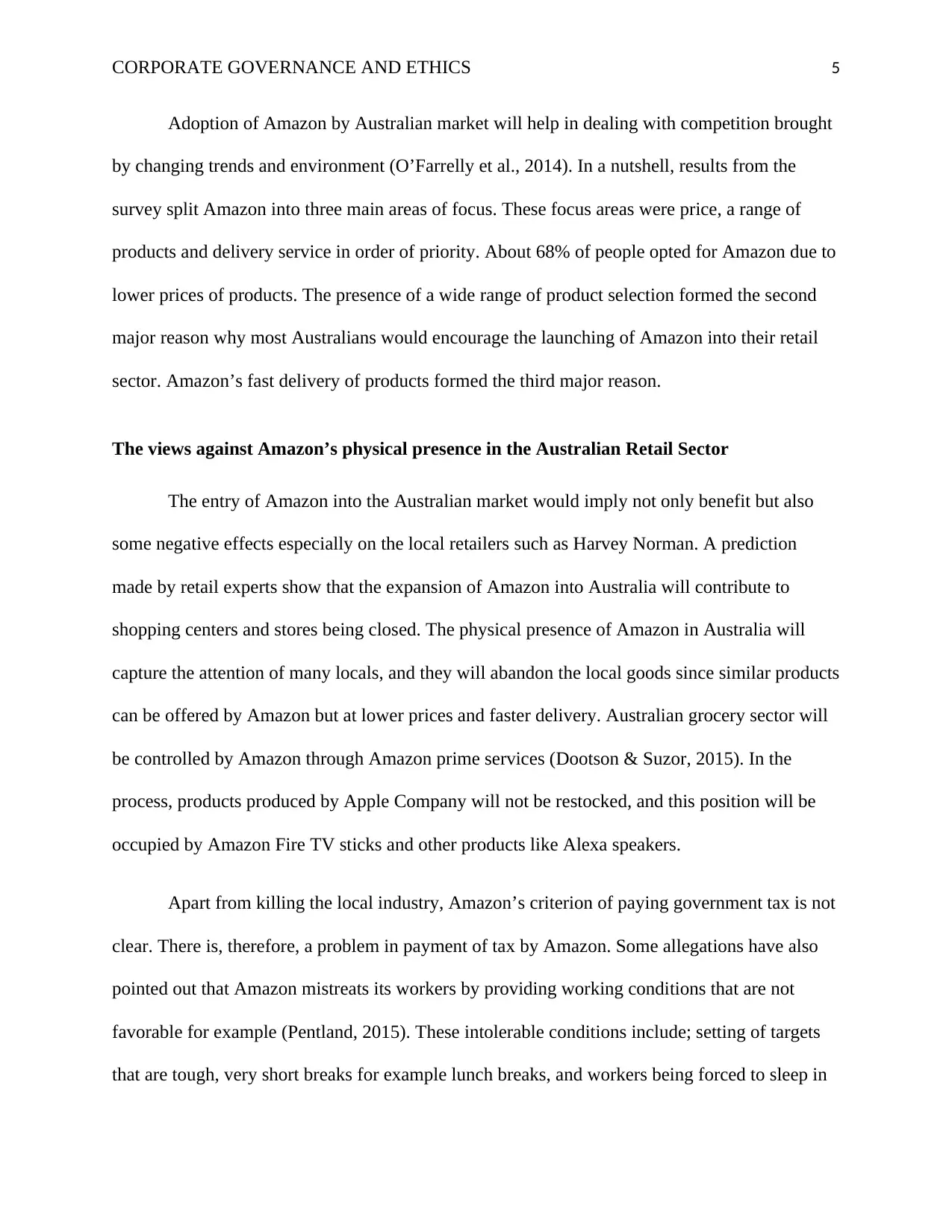
CORPORATE GOVERNANCE AND ETHICS 5
Adoption of Amazon by Australian market will help in dealing with competition brought
by changing trends and environment (O’Farrelly et al., 2014). In a nutshell, results from the
survey split Amazon into three main areas of focus. These focus areas were price, a range of
products and delivery service in order of priority. About 68% of people opted for Amazon due to
lower prices of products. The presence of a wide range of product selection formed the second
major reason why most Australians would encourage the launching of Amazon into their retail
sector. Amazon’s fast delivery of products formed the third major reason.
The views against Amazon’s physical presence in the Australian Retail Sector
The entry of Amazon into the Australian market would imply not only benefit but also
some negative effects especially on the local retailers such as Harvey Norman. A prediction
made by retail experts show that the expansion of Amazon into Australia will contribute to
shopping centers and stores being closed. The physical presence of Amazon in Australia will
capture the attention of many locals, and they will abandon the local goods since similar products
can be offered by Amazon but at lower prices and faster delivery. Australian grocery sector will
be controlled by Amazon through Amazon prime services (Dootson & Suzor, 2015). In the
process, products produced by Apple Company will not be restocked, and this position will be
occupied by Amazon Fire TV sticks and other products like Alexa speakers.
Apart from killing the local industry, Amazon’s criterion of paying government tax is not
clear. There is, therefore, a problem in payment of tax by Amazon. Some allegations have also
pointed out that Amazon mistreats its workers by providing working conditions that are not
favorable for example (Pentland, 2015). These intolerable conditions include; setting of targets
that are tough, very short breaks for example lunch breaks, and workers being forced to sleep in
Adoption of Amazon by Australian market will help in dealing with competition brought
by changing trends and environment (O’Farrelly et al., 2014). In a nutshell, results from the
survey split Amazon into three main areas of focus. These focus areas were price, a range of
products and delivery service in order of priority. About 68% of people opted for Amazon due to
lower prices of products. The presence of a wide range of product selection formed the second
major reason why most Australians would encourage the launching of Amazon into their retail
sector. Amazon’s fast delivery of products formed the third major reason.
The views against Amazon’s physical presence in the Australian Retail Sector
The entry of Amazon into the Australian market would imply not only benefit but also
some negative effects especially on the local retailers such as Harvey Norman. A prediction
made by retail experts show that the expansion of Amazon into Australia will contribute to
shopping centers and stores being closed. The physical presence of Amazon in Australia will
capture the attention of many locals, and they will abandon the local goods since similar products
can be offered by Amazon but at lower prices and faster delivery. Australian grocery sector will
be controlled by Amazon through Amazon prime services (Dootson & Suzor, 2015). In the
process, products produced by Apple Company will not be restocked, and this position will be
occupied by Amazon Fire TV sticks and other products like Alexa speakers.
Apart from killing the local industry, Amazon’s criterion of paying government tax is not
clear. There is, therefore, a problem in payment of tax by Amazon. Some allegations have also
pointed out that Amazon mistreats its workers by providing working conditions that are not
favorable for example (Pentland, 2015). These intolerable conditions include; setting of targets
that are tough, very short breaks for example lunch breaks, and workers being forced to sleep in
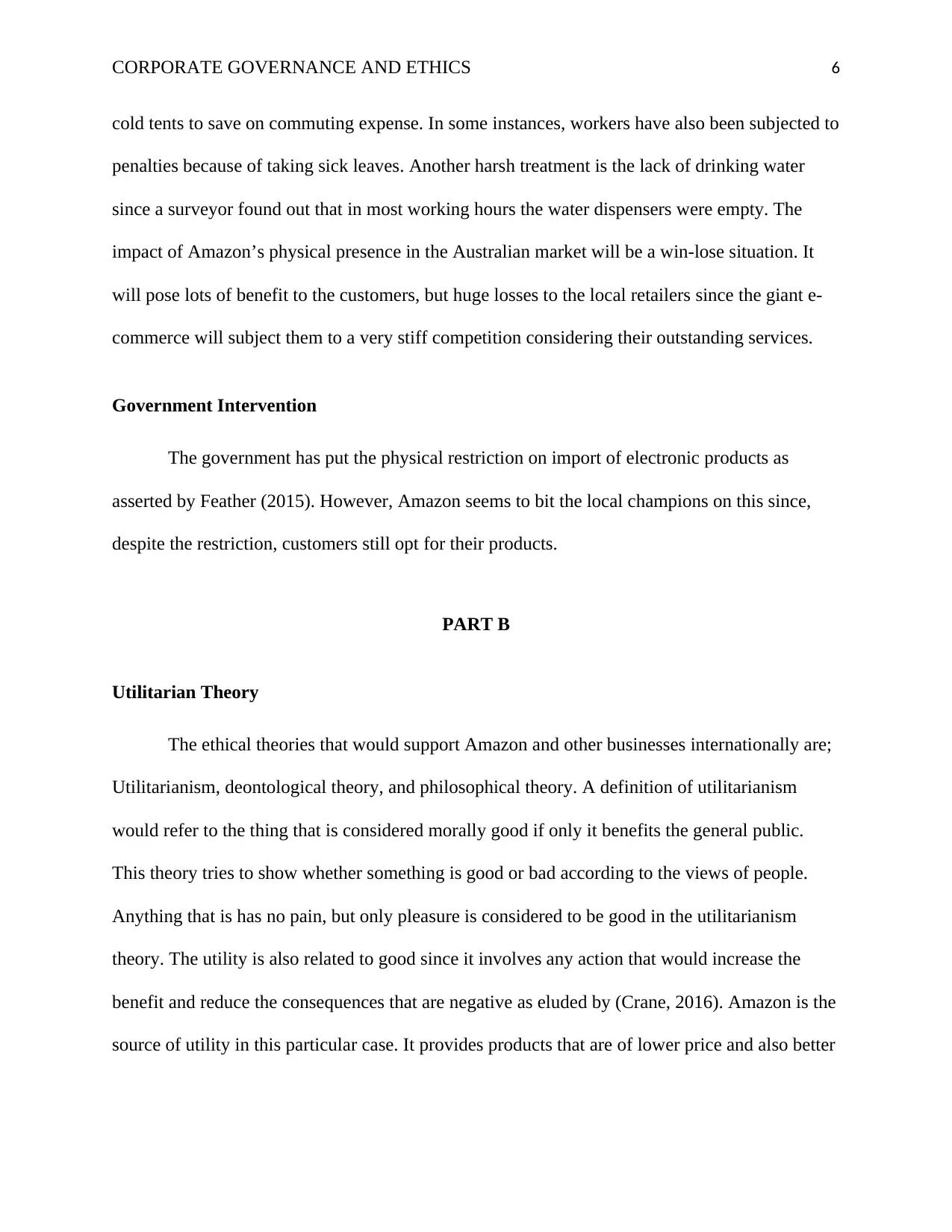
CORPORATE GOVERNANCE AND ETHICS 6
cold tents to save on commuting expense. In some instances, workers have also been subjected to
penalties because of taking sick leaves. Another harsh treatment is the lack of drinking water
since a surveyor found out that in most working hours the water dispensers were empty. The
impact of Amazon’s physical presence in the Australian market will be a win-lose situation. It
will pose lots of benefit to the customers, but huge losses to the local retailers since the giant e-
commerce will subject them to a very stiff competition considering their outstanding services.
Government Intervention
The government has put the physical restriction on import of electronic products as
asserted by Feather (2015). However, Amazon seems to bit the local champions on this since,
despite the restriction, customers still opt for their products.
PART B
Utilitarian Theory
The ethical theories that would support Amazon and other businesses internationally are;
Utilitarianism, deontological theory, and philosophical theory. A definition of utilitarianism
would refer to the thing that is considered morally good if only it benefits the general public.
This theory tries to show whether something is good or bad according to the views of people.
Anything that is has no pain, but only pleasure is considered to be good in the utilitarianism
theory. The utility is also related to good since it involves any action that would increase the
benefit and reduce the consequences that are negative as eluded by (Crane, 2016). Amazon is the
source of utility in this particular case. It provides products that are of lower price and also better
cold tents to save on commuting expense. In some instances, workers have also been subjected to
penalties because of taking sick leaves. Another harsh treatment is the lack of drinking water
since a surveyor found out that in most working hours the water dispensers were empty. The
impact of Amazon’s physical presence in the Australian market will be a win-lose situation. It
will pose lots of benefit to the customers, but huge losses to the local retailers since the giant e-
commerce will subject them to a very stiff competition considering their outstanding services.
Government Intervention
The government has put the physical restriction on import of electronic products as
asserted by Feather (2015). However, Amazon seems to bit the local champions on this since,
despite the restriction, customers still opt for their products.
PART B
Utilitarian Theory
The ethical theories that would support Amazon and other businesses internationally are;
Utilitarianism, deontological theory, and philosophical theory. A definition of utilitarianism
would refer to the thing that is considered morally good if only it benefits the general public.
This theory tries to show whether something is good or bad according to the views of people.
Anything that is has no pain, but only pleasure is considered to be good in the utilitarianism
theory. The utility is also related to good since it involves any action that would increase the
benefit and reduce the consequences that are negative as eluded by (Crane, 2016). Amazon is the
source of utility in this particular case. It provides products that are of lower price and also better
⊘ This is a preview!⊘
Do you want full access?
Subscribe today to unlock all pages.

Trusted by 1+ million students worldwide
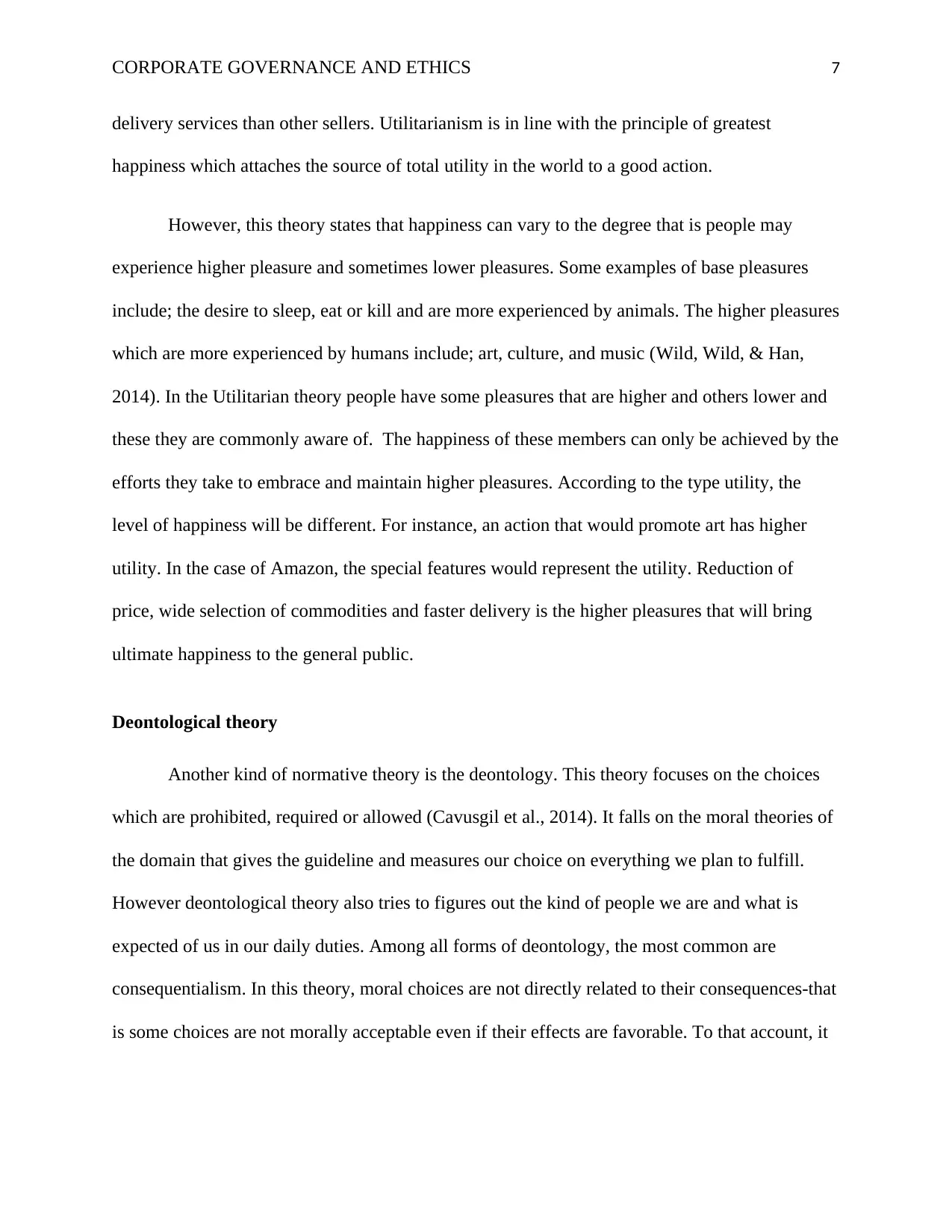
CORPORATE GOVERNANCE AND ETHICS 7
delivery services than other sellers. Utilitarianism is in line with the principle of greatest
happiness which attaches the source of total utility in the world to a good action.
However, this theory states that happiness can vary to the degree that is people may
experience higher pleasure and sometimes lower pleasures. Some examples of base pleasures
include; the desire to sleep, eat or kill and are more experienced by animals. The higher pleasures
which are more experienced by humans include; art, culture, and music (Wild, Wild, & Han,
2014). In the Utilitarian theory people have some pleasures that are higher and others lower and
these they are commonly aware of. The happiness of these members can only be achieved by the
efforts they take to embrace and maintain higher pleasures. According to the type utility, the
level of happiness will be different. For instance, an action that would promote art has higher
utility. In the case of Amazon, the special features would represent the utility. Reduction of
price, wide selection of commodities and faster delivery is the higher pleasures that will bring
ultimate happiness to the general public.
Deontological theory
Another kind of normative theory is the deontology. This theory focuses on the choices
which are prohibited, required or allowed (Cavusgil et al., 2014). It falls on the moral theories of
the domain that gives the guideline and measures our choice on everything we plan to fulfill.
However deontological theory also tries to figures out the kind of people we are and what is
expected of us in our daily duties. Among all forms of deontology, the most common are
consequentialism. In this theory, moral choices are not directly related to their consequences-that
is some choices are not morally acceptable even if their effects are favorable. To that account, it
delivery services than other sellers. Utilitarianism is in line with the principle of greatest
happiness which attaches the source of total utility in the world to a good action.
However, this theory states that happiness can vary to the degree that is people may
experience higher pleasure and sometimes lower pleasures. Some examples of base pleasures
include; the desire to sleep, eat or kill and are more experienced by animals. The higher pleasures
which are more experienced by humans include; art, culture, and music (Wild, Wild, & Han,
2014). In the Utilitarian theory people have some pleasures that are higher and others lower and
these they are commonly aware of. The happiness of these members can only be achieved by the
efforts they take to embrace and maintain higher pleasures. According to the type utility, the
level of happiness will be different. For instance, an action that would promote art has higher
utility. In the case of Amazon, the special features would represent the utility. Reduction of
price, wide selection of commodities and faster delivery is the higher pleasures that will bring
ultimate happiness to the general public.
Deontological theory
Another kind of normative theory is the deontology. This theory focuses on the choices
which are prohibited, required or allowed (Cavusgil et al., 2014). It falls on the moral theories of
the domain that gives the guideline and measures our choice on everything we plan to fulfill.
However deontological theory also tries to figures out the kind of people we are and what is
expected of us in our daily duties. Among all forms of deontology, the most common are
consequentialism. In this theory, moral choices are not directly related to their consequences-that
is some choices are not morally acceptable even if their effects are favorable. To that account, it
Paraphrase This Document
Need a fresh take? Get an instant paraphrase of this document with our AI Paraphraser
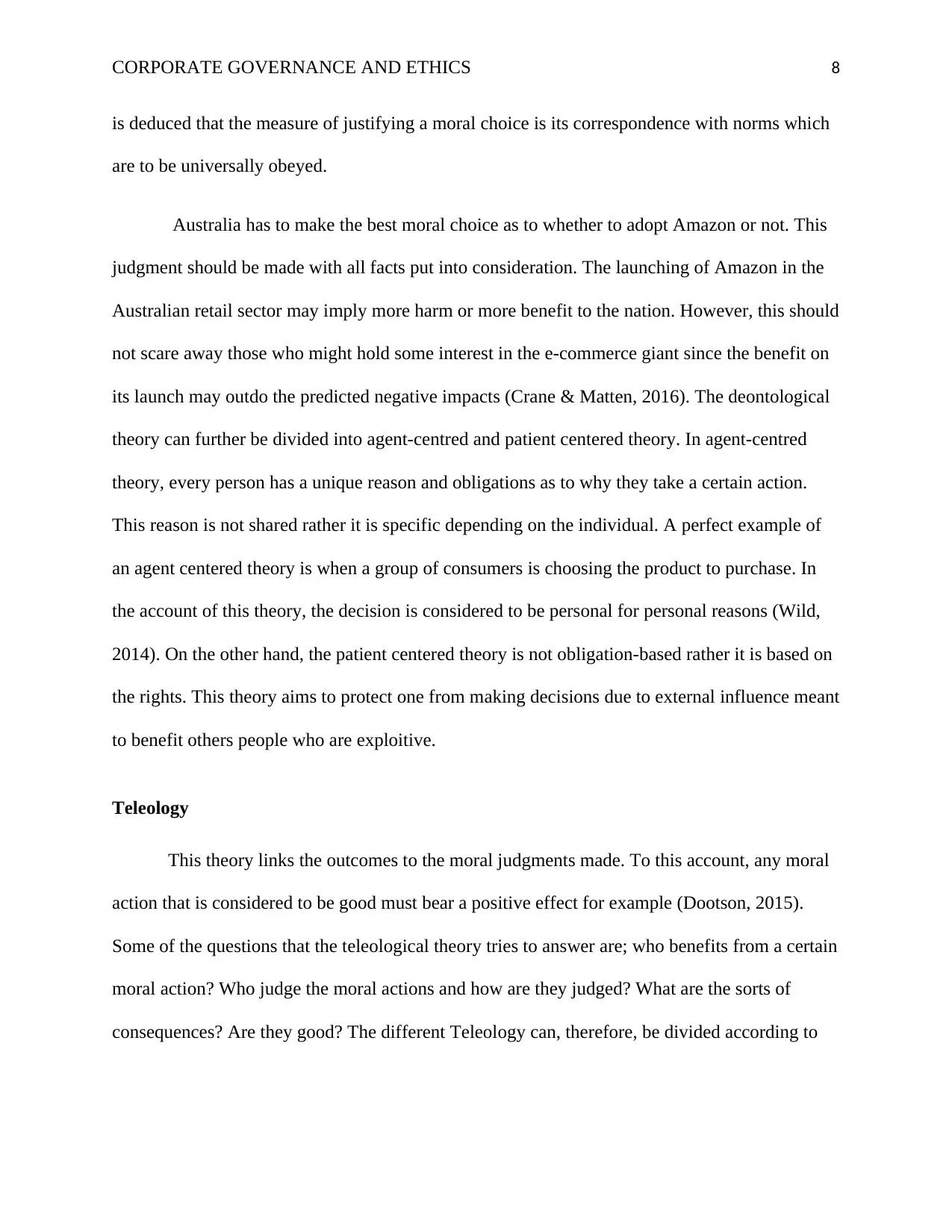
CORPORATE GOVERNANCE AND ETHICS 8
is deduced that the measure of justifying a moral choice is its correspondence with norms which
are to be universally obeyed.
Australia has to make the best moral choice as to whether to adopt Amazon or not. This
judgment should be made with all facts put into consideration. The launching of Amazon in the
Australian retail sector may imply more harm or more benefit to the nation. However, this should
not scare away those who might hold some interest in the e-commerce giant since the benefit on
its launch may outdo the predicted negative impacts (Crane & Matten, 2016). The deontological
theory can further be divided into agent-centred and patient centered theory. In agent-centred
theory, every person has a unique reason and obligations as to why they take a certain action.
This reason is not shared rather it is specific depending on the individual. A perfect example of
an agent centered theory is when a group of consumers is choosing the product to purchase. In
the account of this theory, the decision is considered to be personal for personal reasons (Wild,
2014). On the other hand, the patient centered theory is not obligation-based rather it is based on
the rights. This theory aims to protect one from making decisions due to external influence meant
to benefit others people who are exploitive.
Teleology
This theory links the outcomes to the moral judgments made. To this account, any moral
action that is considered to be good must bear a positive effect for example (Dootson, 2015).
Some of the questions that the teleological theory tries to answer are; who benefits from a certain
moral action? Who judge the moral actions and how are they judged? What are the sorts of
consequences? Are they good? The different Teleology can, therefore, be divided according to
is deduced that the measure of justifying a moral choice is its correspondence with norms which
are to be universally obeyed.
Australia has to make the best moral choice as to whether to adopt Amazon or not. This
judgment should be made with all facts put into consideration. The launching of Amazon in the
Australian retail sector may imply more harm or more benefit to the nation. However, this should
not scare away those who might hold some interest in the e-commerce giant since the benefit on
its launch may outdo the predicted negative impacts (Crane & Matten, 2016). The deontological
theory can further be divided into agent-centred and patient centered theory. In agent-centred
theory, every person has a unique reason and obligations as to why they take a certain action.
This reason is not shared rather it is specific depending on the individual. A perfect example of
an agent centered theory is when a group of consumers is choosing the product to purchase. In
the account of this theory, the decision is considered to be personal for personal reasons (Wild,
2014). On the other hand, the patient centered theory is not obligation-based rather it is based on
the rights. This theory aims to protect one from making decisions due to external influence meant
to benefit others people who are exploitive.
Teleology
This theory links the outcomes to the moral judgments made. To this account, any moral
action that is considered to be good must bear a positive effect for example (Dootson, 2015).
Some of the questions that the teleological theory tries to answer are; who benefits from a certain
moral action? Who judge the moral actions and how are they judged? What are the sorts of
consequences? Are they good? The different Teleology can, therefore, be divided according to
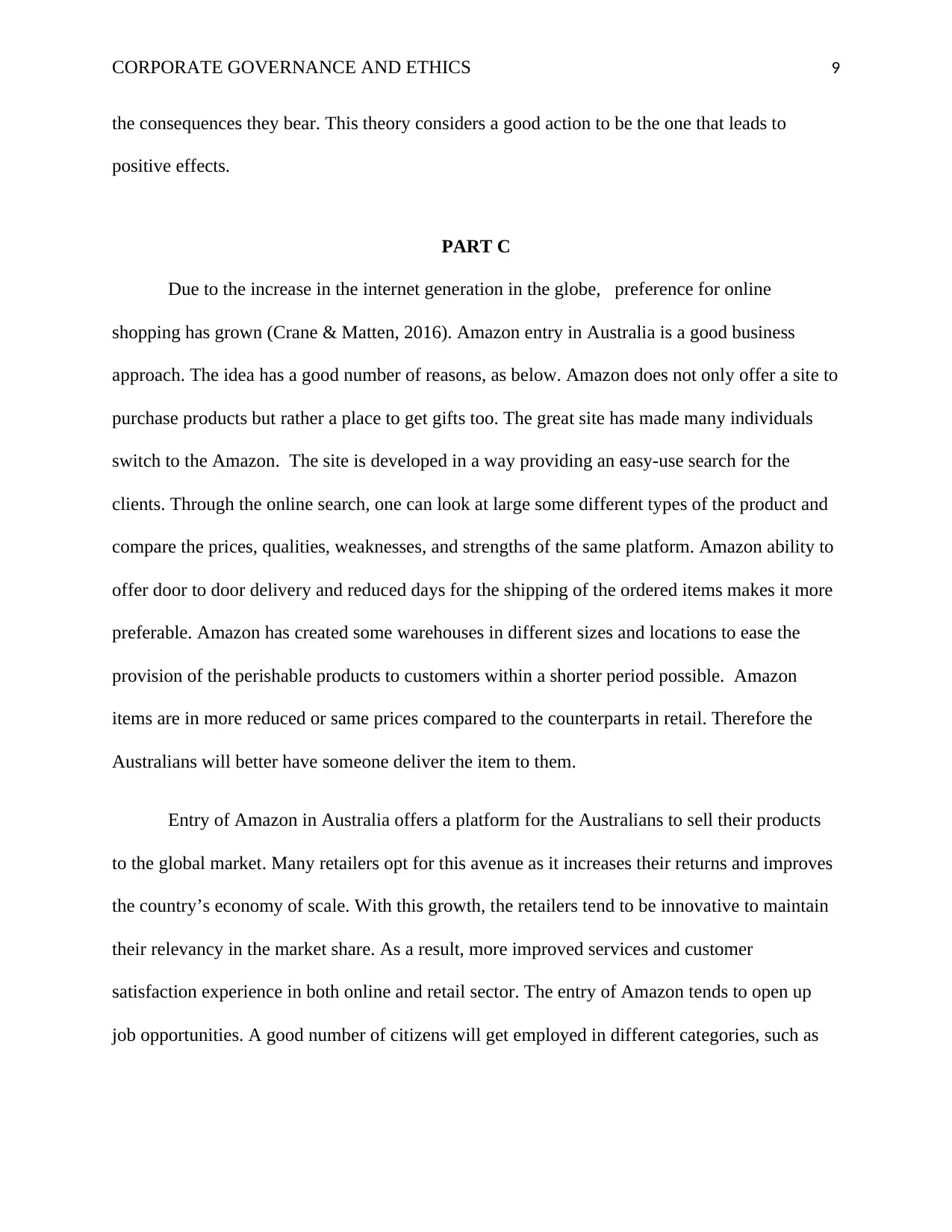
CORPORATE GOVERNANCE AND ETHICS 9
the consequences they bear. This theory considers a good action to be the one that leads to
positive effects.
PART C
Due to the increase in the internet generation in the globe, preference for online
shopping has grown (Crane & Matten, 2016). Amazon entry in Australia is a good business
approach. The idea has a good number of reasons, as below. Amazon does not only offer a site to
purchase products but rather a place to get gifts too. The great site has made many individuals
switch to the Amazon. The site is developed in a way providing an easy-use search for the
clients. Through the online search, one can look at large some different types of the product and
compare the prices, qualities, weaknesses, and strengths of the same platform. Amazon ability to
offer door to door delivery and reduced days for the shipping of the ordered items makes it more
preferable. Amazon has created some warehouses in different sizes and locations to ease the
provision of the perishable products to customers within a shorter period possible. Amazon
items are in more reduced or same prices compared to the counterparts in retail. Therefore the
Australians will better have someone deliver the item to them.
Entry of Amazon in Australia offers a platform for the Australians to sell their products
to the global market. Many retailers opt for this avenue as it increases their returns and improves
the country’s economy of scale. With this growth, the retailers tend to be innovative to maintain
their relevancy in the market share. As a result, more improved services and customer
satisfaction experience in both online and retail sector. The entry of Amazon tends to open up
job opportunities. A good number of citizens will get employed in different categories, such as
the consequences they bear. This theory considers a good action to be the one that leads to
positive effects.
PART C
Due to the increase in the internet generation in the globe, preference for online
shopping has grown (Crane & Matten, 2016). Amazon entry in Australia is a good business
approach. The idea has a good number of reasons, as below. Amazon does not only offer a site to
purchase products but rather a place to get gifts too. The great site has made many individuals
switch to the Amazon. The site is developed in a way providing an easy-use search for the
clients. Through the online search, one can look at large some different types of the product and
compare the prices, qualities, weaknesses, and strengths of the same platform. Amazon ability to
offer door to door delivery and reduced days for the shipping of the ordered items makes it more
preferable. Amazon has created some warehouses in different sizes and locations to ease the
provision of the perishable products to customers within a shorter period possible. Amazon
items are in more reduced or same prices compared to the counterparts in retail. Therefore the
Australians will better have someone deliver the item to them.
Entry of Amazon in Australia offers a platform for the Australians to sell their products
to the global market. Many retailers opt for this avenue as it increases their returns and improves
the country’s economy of scale. With this growth, the retailers tend to be innovative to maintain
their relevancy in the market share. As a result, more improved services and customer
satisfaction experience in both online and retail sector. The entry of Amazon tends to open up
job opportunities. A good number of citizens will get employed in different categories, such as
⊘ This is a preview!⊘
Do you want full access?
Subscribe today to unlock all pages.

Trusted by 1+ million students worldwide
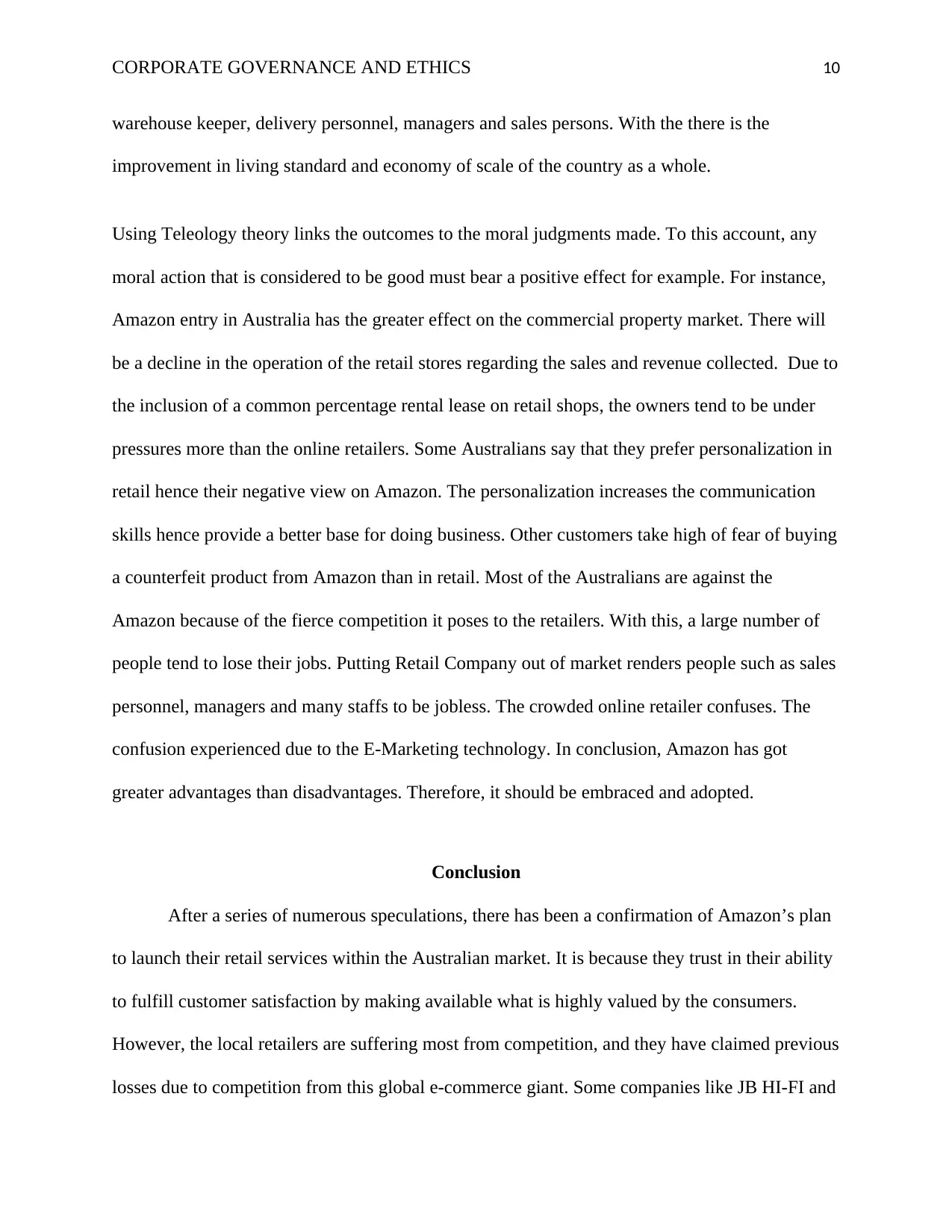
CORPORATE GOVERNANCE AND ETHICS 10
warehouse keeper, delivery personnel, managers and sales persons. With the there is the
improvement in living standard and economy of scale of the country as a whole.
Using Teleology theory links the outcomes to the moral judgments made. To this account, any
moral action that is considered to be good must bear a positive effect for example. For instance,
Amazon entry in Australia has the greater effect on the commercial property market. There will
be a decline in the operation of the retail stores regarding the sales and revenue collected. Due to
the inclusion of a common percentage rental lease on retail shops, the owners tend to be under
pressures more than the online retailers. Some Australians say that they prefer personalization in
retail hence their negative view on Amazon. The personalization increases the communication
skills hence provide a better base for doing business. Other customers take high of fear of buying
a counterfeit product from Amazon than in retail. Most of the Australians are against the
Amazon because of the fierce competition it poses to the retailers. With this, a large number of
people tend to lose their jobs. Putting Retail Company out of market renders people such as sales
personnel, managers and many staffs to be jobless. The crowded online retailer confuses. The
confusion experienced due to the E-Marketing technology. In conclusion, Amazon has got
greater advantages than disadvantages. Therefore, it should be embraced and adopted.
Conclusion
After a series of numerous speculations, there has been a confirmation of Amazon’s plan
to launch their retail services within the Australian market. It is because they trust in their ability
to fulfill customer satisfaction by making available what is highly valued by the consumers.
However, the local retailers are suffering most from competition, and they have claimed previous
losses due to competition from this global e-commerce giant. Some companies like JB HI-FI and
warehouse keeper, delivery personnel, managers and sales persons. With the there is the
improvement in living standard and economy of scale of the country as a whole.
Using Teleology theory links the outcomes to the moral judgments made. To this account, any
moral action that is considered to be good must bear a positive effect for example. For instance,
Amazon entry in Australia has the greater effect on the commercial property market. There will
be a decline in the operation of the retail stores regarding the sales and revenue collected. Due to
the inclusion of a common percentage rental lease on retail shops, the owners tend to be under
pressures more than the online retailers. Some Australians say that they prefer personalization in
retail hence their negative view on Amazon. The personalization increases the communication
skills hence provide a better base for doing business. Other customers take high of fear of buying
a counterfeit product from Amazon than in retail. Most of the Australians are against the
Amazon because of the fierce competition it poses to the retailers. With this, a large number of
people tend to lose their jobs. Putting Retail Company out of market renders people such as sales
personnel, managers and many staffs to be jobless. The crowded online retailer confuses. The
confusion experienced due to the E-Marketing technology. In conclusion, Amazon has got
greater advantages than disadvantages. Therefore, it should be embraced and adopted.
Conclusion
After a series of numerous speculations, there has been a confirmation of Amazon’s plan
to launch their retail services within the Australian market. It is because they trust in their ability
to fulfill customer satisfaction by making available what is highly valued by the consumers.
However, the local retailers are suffering most from competition, and they have claimed previous
losses due to competition from this global e-commerce giant. Some companies like JB HI-FI and
Paraphrase This Document
Need a fresh take? Get an instant paraphrase of this document with our AI Paraphraser
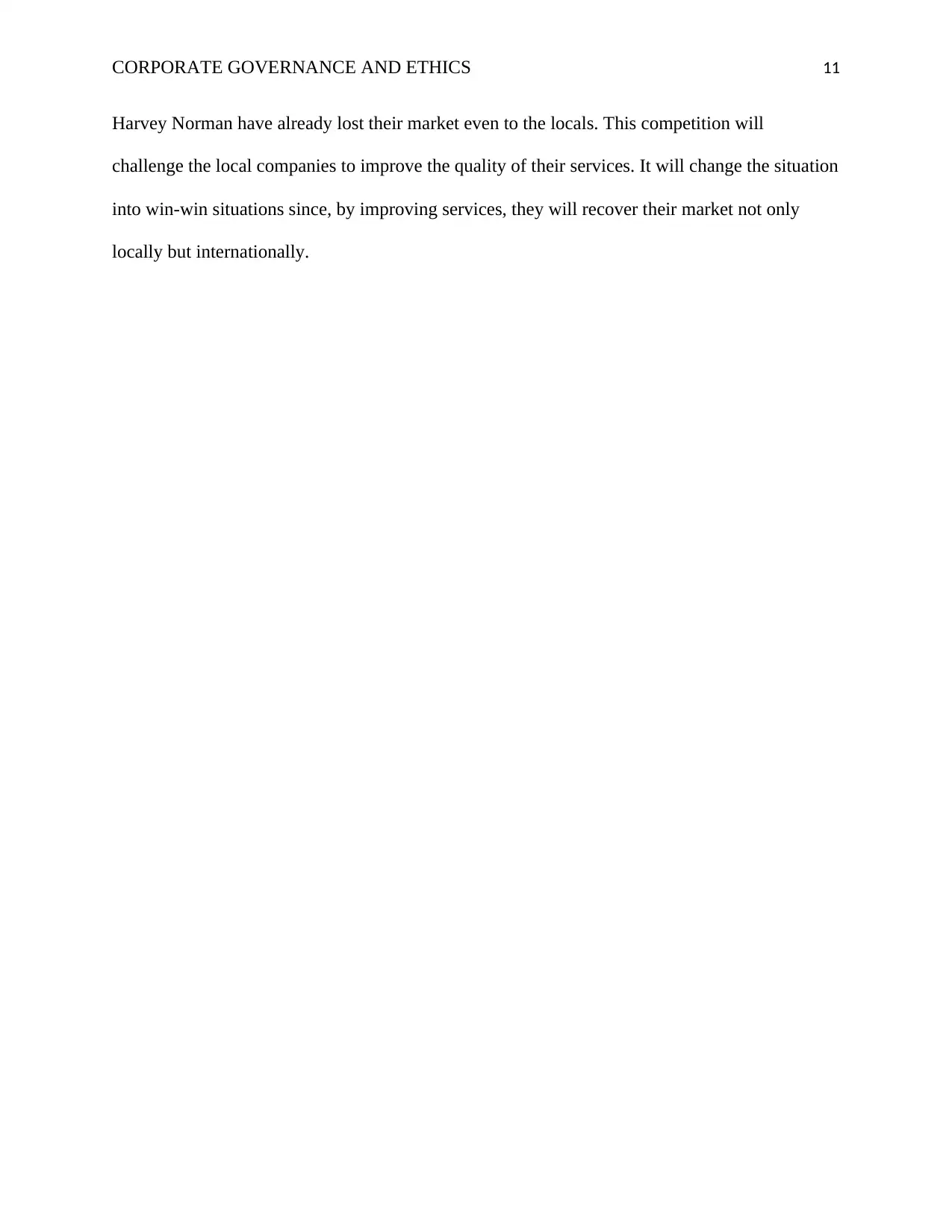
CORPORATE GOVERNANCE AND ETHICS 11
Harvey Norman have already lost their market even to the locals. This competition will
challenge the local companies to improve the quality of their services. It will change the situation
into win-win situations since, by improving services, they will recover their market not only
locally but internationally.
Harvey Norman have already lost their market even to the locals. This competition will
challenge the local companies to improve the quality of their services. It will change the situation
into win-win situations since, by improving services, they will recover their market not only
locally but internationally.
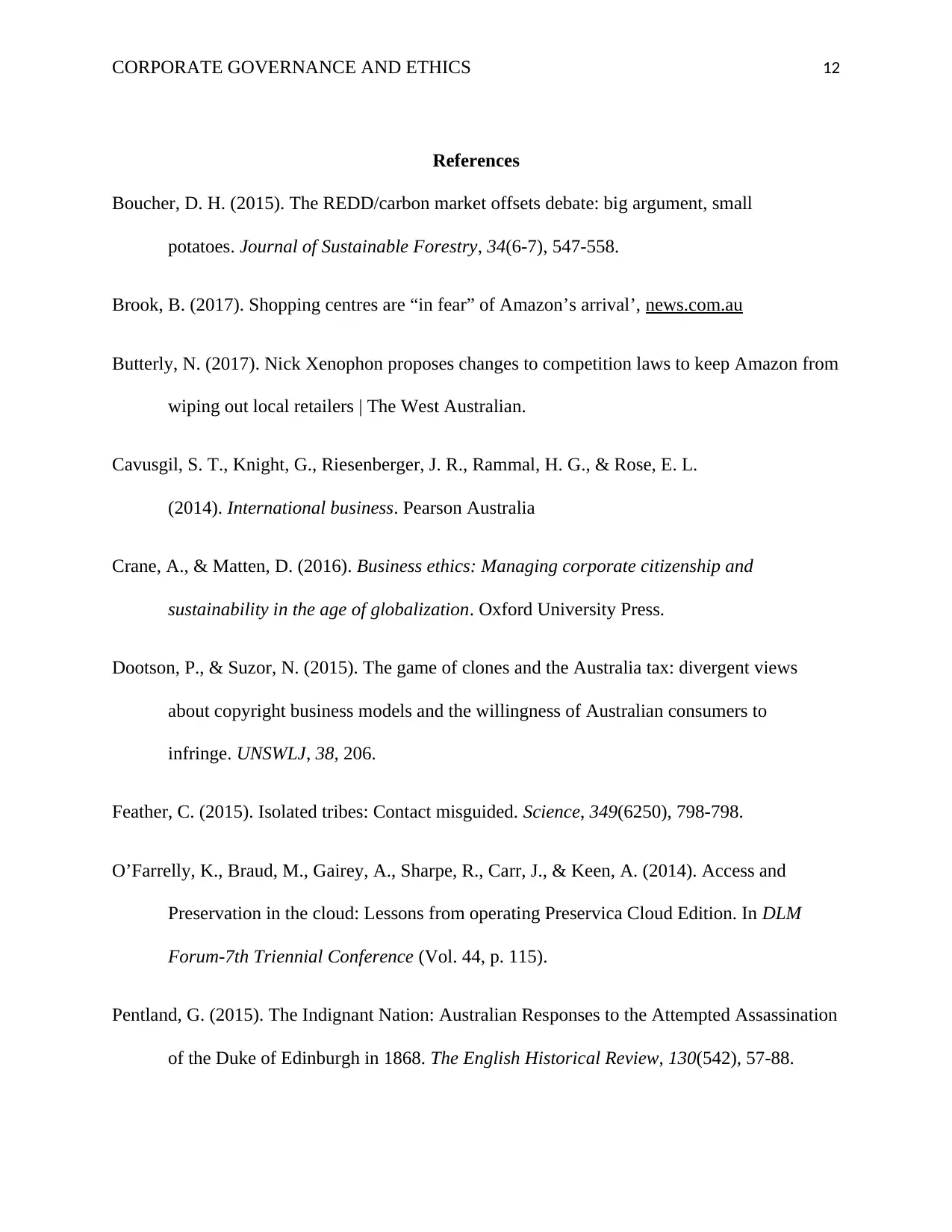
CORPORATE GOVERNANCE AND ETHICS 12
References
Boucher, D. H. (2015). The REDD/carbon market offsets debate: big argument, small
potatoes. Journal of Sustainable Forestry, 34(6-7), 547-558.
Brook, B. (2017). Shopping centres are “in fear” of Amazon’s arrival’, news.com.au
Butterly, N. (2017). Nick Xenophon proposes changes to competition laws to keep Amazon from
wiping out local retailers | The West Australian.
Cavusgil, S. T., Knight, G., Riesenberger, J. R., Rammal, H. G., & Rose, E. L.
(2014). International business. Pearson Australia
Crane, A., & Matten, D. (2016). Business ethics: Managing corporate citizenship and
sustainability in the age of globalization. Oxford University Press.
Dootson, P., & Suzor, N. (2015). The game of clones and the Australia tax: divergent views
about copyright business models and the willingness of Australian consumers to
infringe. UNSWLJ, 38, 206.
Feather, C. (2015). Isolated tribes: Contact misguided. Science, 349(6250), 798-798.
O’Farrelly, K., Braud, M., Gairey, A., Sharpe, R., Carr, J., & Keen, A. (2014). Access and
Preservation in the cloud: Lessons from operating Preservica Cloud Edition. In DLM
Forum-7th Triennial Conference (Vol. 44, p. 115).
Pentland, G. (2015). The Indignant Nation: Australian Responses to the Attempted Assassination
of the Duke of Edinburgh in 1868. The English Historical Review, 130(542), 57-88.
References
Boucher, D. H. (2015). The REDD/carbon market offsets debate: big argument, small
potatoes. Journal of Sustainable Forestry, 34(6-7), 547-558.
Brook, B. (2017). Shopping centres are “in fear” of Amazon’s arrival’, news.com.au
Butterly, N. (2017). Nick Xenophon proposes changes to competition laws to keep Amazon from
wiping out local retailers | The West Australian.
Cavusgil, S. T., Knight, G., Riesenberger, J. R., Rammal, H. G., & Rose, E. L.
(2014). International business. Pearson Australia
Crane, A., & Matten, D. (2016). Business ethics: Managing corporate citizenship and
sustainability in the age of globalization. Oxford University Press.
Dootson, P., & Suzor, N. (2015). The game of clones and the Australia tax: divergent views
about copyright business models and the willingness of Australian consumers to
infringe. UNSWLJ, 38, 206.
Feather, C. (2015). Isolated tribes: Contact misguided. Science, 349(6250), 798-798.
O’Farrelly, K., Braud, M., Gairey, A., Sharpe, R., Carr, J., & Keen, A. (2014). Access and
Preservation in the cloud: Lessons from operating Preservica Cloud Edition. In DLM
Forum-7th Triennial Conference (Vol. 44, p. 115).
Pentland, G. (2015). The Indignant Nation: Australian Responses to the Attempted Assassination
of the Duke of Edinburgh in 1868. The English Historical Review, 130(542), 57-88.
⊘ This is a preview!⊘
Do you want full access?
Subscribe today to unlock all pages.

Trusted by 1+ million students worldwide
1 out of 13
Related Documents
Your All-in-One AI-Powered Toolkit for Academic Success.
+13062052269
info@desklib.com
Available 24*7 on WhatsApp / Email
![[object Object]](/_next/static/media/star-bottom.7253800d.svg)
Unlock your academic potential
Copyright © 2020–2026 A2Z Services. All Rights Reserved. Developed and managed by ZUCOL.



